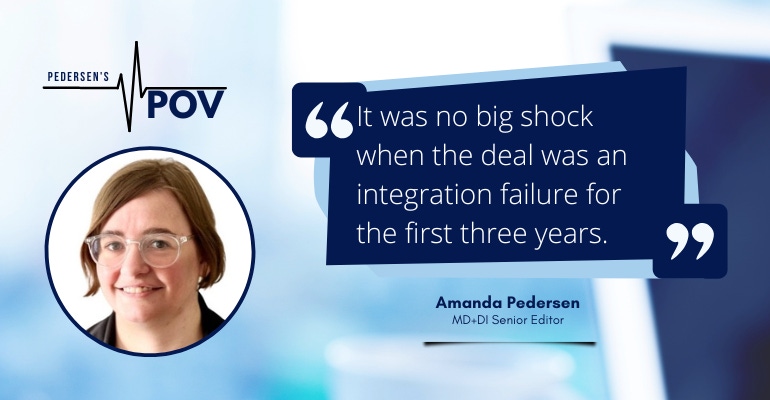Star Wars Lessons for Medtech
In honor of the 40th anniversary of "Return of the Jedi," our senior editor applies lessons from the Star Wars franchise to the world of medtech.
May 1, 2023

I haven't always been a Star Wars fan.
In high school, one of my closest friends made me watch the original "Star Wars" movie trilogy with him as some sort of cruel and unusual punishment for a perceived offense neither of us can recall now. I liked some of the core characters (especially Chewbacca, C-3PO, and R2-D2). But the storyline was lost on me back then.
Fast forward many years, after re-watching the original trilogy with my husband and son, I finally "got it." I'll never be as big of a Star Wars fan as they are, but I can appreciate some of the wisdom that can be gleaned from a galaxy far, far away.
In honor of the 40th anniversary of "Star Wars: Return of the Jedi," I spent the weekend re-watching Luke Skywalker face Darth Vader in a final light saber dual, and catching up on the latest season of "The Mandalorian," a popular "Star Wars" spin-off series on Disney+.
I had planned on sharing lessons for medtech gleaned from "Return of the Jedi," but my list began to inadvertently mirror that of a former MD+DI editor's 7 Star Wars Lessons for Medtech, published in 2015. So, rather than reinvent the wheel, I've focused my insights on the third season of "The Mandalorian."
This is where I must add the obligatory spoiler alert disclaimer. If you have not seen "The Mandalorian" Season 3 and wish to avoid spoilers, please bookmark this page and come back after you've finished the eight-episode season.
Spoilers ahead: Medtech lessons from "The Mandalorian"
1. Technology developed with the best of intentions can still be used for evil
The bulk of Season 3, Episode 3 (a.k.a. chapter 19) deals with former Imperials who have found amnesty in the New Republic and takes place on Coruscant. This side story opens with Penn Pershing (Omid Abtahi), a former Imperial scientist who served the evil Moff Gideon, giving a public speech about his cloning research. He reveals that the research was originally motivated by the death of his mother, which he believes could have been prevented if cloning technology had been available.
In the wrong hands, however, Pershing's research was proven dangerous.
"My research was twisted into something cruel and inhumane, at the behest of a desperate individual intent on using cloning technology to secure more power for himself," he says.
The lesson for medtech is that even with the best of intentions, potentially "good" technology can be used for evil if not handled responsibly.
2. Sometimes, you've got to trust your gut
In the same episode, Pershing forms a connection with Elia Kane (Katy O'Brian). Although Kane is just manipulating Pershing, the character does make some good points in the process.
"Following orders blindly is how we got in trouble in the first place," Kane says to Pershing. "Sometimes you’ve got to trust your gut."
The line reminded me of Tyler Shultz, Erika Cheung, and other Theranos whistleblowers. Imagine how long the Theranos fraud would have gone on if these employees had simply followed orders blindly rather than trusting their gut and finding the courage to blow the whistle.
3. This is the way (define your core values)
Throughout "The Mandalorian" series the main character is driven by a strict system of core values, referred to by the Mandalorians as "the creed." Medtech companies must also have a clearly defined set of core values that everyone in the organization is expected to follow.
Medtronic does this particularly well. Written in 1960, the Medtronic mission statement continues to serve as its ethical framework and inspirational goal for employees. The statement includes six tenants but the first and foremost priority, according to the company, is to contribute to human welfare.
To give you an idea of just how deeply engrained the company's mission statement is in Medtronic culture, nearly every Medtronic employee I ever interview recites at least part of the mission at some point during the interview. I rarely include this in the published article, simply because it doesn't add any real value to the story itself, but I nonetheless admire their commitment.
4. Don't let division destroy you
Perhaps the most important medtech takeaway from this season of "The Mandalorian" is found in the season finale. Bo-Katan Kraze (Katee Sackhoff) is charged with bringing all Mandalorians together. This means both Din Djarin's coven, which follows "the old ways," and her people. The two factions had never previously met, and what little they did know of each other before this season, they hated.
"It's always our own division that destroys us," Bo-Katan says of the Mandalorian factions.
The same holds true in medtech.
The rough integration following Zimmer's acquisition of Biomet in June 2015 is a perfect example. Not only did this $14 billion deal bring together two rivals from the orthopedic device sector, but the two companies both called Warsaw, IN home. So, it was no big shock when the deal was an integration failure for the first three years.
When CEO Bryan Hanson joined Zimmer Biomet in December 2018, the company still saw itself as two organizations rather than one integrated company. Under Hanson's leadership, the company drafted a new corporate mission, and held more than 40 mission ceremonies in 13 countries meeting with more than 11,000 team members.
Hanson made Zimmer Biomet culture a top priority throughout 2019. Medtech analysts and journalists quickly learned to refer to the company as Zimmer Biomet, rather than just Zimmer, or risk having Hanson put you in your place over the distinction. As Bo-Katan observed about the Mandalorians, Hanson recognized that the company's internal division was working against its objectives.
About the Author(s)
You May Also Like



.png?width=300&auto=webp&quality=80&disable=upscale)
